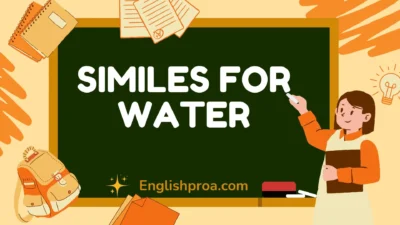Simplicity can be powerful. Whether you’re writing, speaking, or just trying to connect with someone, choosing words that feel warm and genuinely thoughtful can make all the difference. That’s why idioms for “simple” are so helpful. They’re rich in meaning, emotionally resonant, and can express ideas with grace and ease.
In this post, we’ll walk through 30 idioms that can help you talk about simplicity in a way that feels authentic, caring, and easy to understand. I’ve used many of these in conversations, emails, and even journal entries when I’ve wanted to cut through the noise and speak from the heart. These idioms aren’t just useful—they’re comforting in their own way.
1. Plain as day
Meaning: Very easy to see or understand.
In a sentence: Her love for him was plain as day.
Best Use: When you want to emphasize clarity in feelings or truth.
Not Use: For situations involving complexity or ambiguity.
Other ways to say: crystal clear, obvious, no-brainer.
2. As easy as pie
Meaning: Very simple or effortless.
In a sentence: Fixing the issue was as easy as pie.
Best Use: When describing tasks or actions that require little effort.
Not Use: In serious or sensitive conversations where tone matters.
Other ways to say: a piece of cake, no sweat, child’s play.
3. Straight from the horse’s mouth
Meaning: From a reliable source; simple and direct information.
In a sentence: I heard it straight from the horse’s mouth.
Best Use: When emphasizing direct, clear communication.
Not Use: When the source is unclear or indirect.
Other ways to say: firsthand, directly, without a middleman.
4. Easy does it
Meaning: Take it slow and be gentle.
In a sentence: Easy does it—no need to rush.
Best Use: In calming or reassuring situations.
Not Use: When urgency or speed is needed.
Other ways to say: slow down, take your time, steady now.
5. Keep it simple
Meaning: Avoid complications; stay clear and concise.
In a sentence: Let’s keep it simple and focus on what matters.
Best Use: In planning, communication, or design.
Not Use: When complexity is essential.
Other ways to say: simplify, streamline, don’t overthink it.
6. Not rocket science
Meaning: Not complicated or hard to understand.
In a sentence: Cooking pasta is not rocket science.
Best Use: In casual, humorous contexts.
Not Use: When belittling someone’s effort may seem insensitive.
Other ways to say: it’s basic, straightforward, common sense.
7. Cut and dried
Meaning: Clearly decided or straightforward.
In a sentence: The decision was cut and dried.
Best Use: For processes or outcomes with no ambiguity.
Not Use: For emotionally nuanced or uncertain issues.
Other ways to say: settled, decided, clear-cut.
8. Clear as a bell
Meaning: Very clear and easy to understand.
In a sentence: Her instructions were clear as a bell.
Best Use: In communication or direction-giving.
Not Use: In abstract or emotionally complicated contexts.
Other ways to say: sharp, precise, unmistakable.
9. Like shooting fish in a barrel
Meaning: Extremely easy to do.
In a sentence: Beating them at trivia was like shooting fish in a barrel.
Best Use: In lighthearted or competitive settings.
Not Use: When humility or sensitivity is needed.
Other ways to say: ridiculously easy, effortless.
10. A walk in the park
Meaning: Something very easy or pleasant.
In a sentence: That exam was a walk in the park.
Best Use: To describe tasks or experiences.
Not Use: In conversations about serious challenges.
Other ways to say: breeze, easygoing, stress-free.
11. No-brainer
Meaning: An easy decision or solution.
In a sentence: Choosing love over fear is a no-brainer.
Best Use: When the obvious choice is also the kind one.
Not Use: In high-stakes or complicated decisions.
Other ways to say: obvious, clear choice, done deal.
12. Down to earth
Meaning: Simple, humble, and practical.
In a sentence: She’s kind and down to earth.
Best Use: For personality descriptions.
Not Use: When describing flashy or eccentric people.
Other ways to say: grounded, humble, real.
13. Boil it down
Meaning: Simplify something to its core.
In a sentence: Let’s boil it down to the essentials.
Best Use: When analyzing or summarizing.
Not Use: When detail is important.
Other ways to say: simplify, condense, distill.
14. To the point
Meaning: Concise and direct.
In a sentence: Her answer was to the point.
Best Use: For clear communication.
Not Use: When tact or diplomacy is needed.
Other ways to say: blunt, brief, straightforward.
15. Black and white
Meaning: Clearly defined or simple.
In a sentence: For her, it’s all black and white.
Best Use: When things are right or wrong, no in-between.
Not Use: In gray-area discussions.
Other ways to say: binary, definite, unambiguous.
16. Plain sailing
Meaning: Smooth and easy progress.
In a sentence: After that hurdle, it was plain sailing.
Best Use: Describing a period after difficulties.
Not Use: During struggle or conflict.
Other ways to say: smooth ride, no trouble.
17. Like clockwork
Meaning: Something happens predictably or effortlessly.
In a sentence: Everything ran like clockwork.
Best Use: Describing efficiency.
Not Use: When spontaneity is valued.
Other ways to say: routine, on cue, seamless.
18. The bare bones
Meaning: The simplest or most essential parts.
In a sentence: He gave me the bare bones of the plan.
Best Use: When simplifying an explanation.
Not Use: When full detail is needed.
Other ways to say: core, basics, essentials.
19. Like taking candy from a baby
Meaning: Extremely easy (sometimes unfairly so).
In a sentence: That negotiation was like taking candy from a baby.
Best Use: Playful exaggeration.
Not Use: In ethical or serious discussions.
Other ways to say: effortless, one-sided.
20. Easy as ABC
Meaning: Very easy or straightforward.
In a sentence: This recipe is easy as ABC.
Best Use: In teaching or giving guidance.
Not Use: In emotionally complex topics.
Other ways to say: basic, beginner-level.
21. Plain and simple
Meaning: Without any complexity or embellishment.
In a sentence: It’s wrong—plain and simple.
Best Use: For strong, clear opinions.
Not Use: In nuanced debates.
Other ways to say: obviously, clearly.
22. In layman’s terms
Meaning: Explained simply for everyone to understand.
In a sentence: Let me explain it in layman’s terms.
Best Use: When clarifying technical topics.
Not Use: In highly specialized settings.
Other ways to say: simplified, put simply.
23. Child’s play
Meaning: So easy a child could do it.
In a sentence: For him, fixing a computer is child’s play.
Best Use: For technical or mechanical simplicity.
Not Use: When effort is involved.
Other ways to say: a cinch, nothing to it.
24. Cut to the chase
Meaning: Skip the fluff and get to the point.
In a sentence: Let’s cut to the chase—what do you want?
Best Use: For directness.
Not Use: In sensitive conversations.
Other ways to say: get real, get to it.
25. Nothing to write home about
Meaning: Not impressive or complicated.
In a sentence: The design was nothing to write home about.
Best Use: Describing modest or unremarkable things.
Not Use: When highlighting something positive.
Other ways to say: average, plain, meh.
26. Right off the bat
Meaning: Immediately or without delay.
In a sentence: She understood right off the bat.
Best Use: In describing instant understanding.
Not Use: When something took time.
Other ways to say: instantly, at once.
27. Open and shut
Meaning: Very straightforward or clear-cut.
In a sentence: It was an open and shut case.
Best Use: Legal or decision-making scenarios.
Not Use: In emotionally complex issues.
Other ways to say: obvious, clear outcome.
28. All sewn up
Meaning: Completed or resolved simply.
In a sentence: We’ve got the deal all sewn up.
Best Use: Celebrating resolution.
Not Use: Before final results.
Other ways to say: done, complete.
29. Bread and butter
Meaning: Basic or essential element.
In a sentence: Writing is my bread and butter.
Best Use: Referring to essentials.
Not Use: When talking about luxuries.
Other ways to say: foundation, staple, necessity.
30. Crystal clear
Meaning: Extremely clear or understandable.
In a sentence: The message was crystal clear.
Best Use: Emphasizing clarity.
Not Use: When things are still murky.
Other ways to say: transparent, clear-cut.
FAQs
1. Why use idioms to express simplicity?
Idioms offer relatable and emotional clarity, making conversations feel more human and engaging.
2. Are idioms appropriate in professional writing?
Yes—when used mindfully. They can add warmth and help clarify ideas in non-technical contexts.
3. Can idioms sound outdated?
Some can, but the 30 here are widely used and feel fresh when spoken with authenticity.
4. What if English isn’t my first language?
Start with idioms like easy as pie or cut to the chase. They’re visual, memorable, and often used in spoken English.
5. How do I know if I’m using an idiom correctly?
Practice in context. If unsure, ask someone or read examples in blogs, books, or friendly emails.
Conclusion
Language doesn’t have to be complicated to be powerful. When we embrace the simple beauty of idioms, we unlock a way to speak that’s not only clear but full of heart.
These expressions can help you connect, comfort, and convey your thoughts in a way that’s warm, approachable, and deeply human. I’ve leaned on many of these when I wanted my words to feel real—not rehearsed. And that’s the true beauty of keeping things simple.
So the next time you’re writing or speaking, reach for an idiom. You might just find the perfect way to say something meaningful… in the most simple and beautiful way possible.





